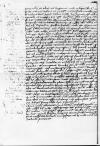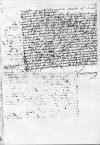Letter #5771
Ioannes DANTISCUS to [Alfonso] de VALDÉSValladolid, 1529-02-01
English register:
Dantiscus is replying to Valdés’ letter of January 16, sent to him with a whole packet of letters from his other friends [preserved letters from Johann Albrecht von Brandenburg-Ansbach, Maximiliaan van Egmond-Buren, Juan Antonio Marliano, Nicolas Perrenot de Granvelle]. He read it several times with great joy. He’s glad Valdés doesn’t attach importance to ceremony. He comments on the Lalemand affair that Valdés described to him. He thinks it would be very bad if the man avoided punishment. He encloses an epicedium and epitaph he has written for Lalemand, not that he wishes him death, but to fulfill his friends’ request. He promises to send Pasquillus and other [texts] when he leaves Spain, all of it is not ready for printing yet. He wants Valdés to send him his dialogue, of which rumors in Valladolid say it was written by the admiral [of Castile, Fadrique Enríquez de Velasco]. He also asks for Valdés’ Latin piece about the duel – he values it for its historical veracity and the final act featuring the emperor’s envoy to France. He wonders why the text hasn’t been printed yet even though everything has been described in detail in Spanish. He doesn’t know why the emperor needs to look through it or how he will do it, unless it is translated to him by the bishop of Osma [Juan García de Loaysa y Mendoza]. He cites an anecdote about the bishop of Osma and his lover, Maria de la Torre. At the time when the bishop of Osma was the general of the [Dominican] Order, his lover lived at a convent and enjoyed the reputation of a saint, but when she died it turned out she had 2 sons with the general. Being ironic, Dantiscus praises the bishop of Osma for his natural drive to father children and for the grand wedding he gave a [female] cousin of his who was married in Burgos. He thinks the stories about the bishop of Osma are excellent material for Pasquillus. Dantiscus is happy that the chancellor [Mercurino Gattinara] is back, but he would be more pleased if he had regained his health. He is writing to him briefly and asks Valdés to supplement the letter with any necessary comments himself, and to give his regards to the chancellor. He jokingly accuses Valdés of having aroused his ambition – he is returning the document granting him the title of eques auratus for correction; among other things, he wants to add some details about his birth, and especially to have it emphasized that the title comes from the Spanish court rather than the imperial one, because the Spanish title is valued more in his country. He gives Valdés free rein in editing the corrections. He asks Valdés to transfer any correspondence through the Welsers, who will cover all the costs, to Sarmatia he can send letters through the Fuggers as well, addressing them to their agent in Cracow, Georg Hegel. Dantiscus asks Valdés to issue a new document releasing him from service at the imperial court because when he was leaving Toledo on December 17 [1528] his previous document of release was already 3 months old. Dantiscus is worried that the servant he sent on January 7 to get his diplomatic passport from Bayonne hasn’t returned yet. He won’t leave Valladolid until he receives Valdés’ reply, unless it is Lent by then, in which case he will seek a place more abundant in fish. He repeats after his previous letter that he is getting childish, for nothing gives him pleasure but literary pastimes. Apart from this, every Sunday he listens to the devout and truly Christian sermons of a Benedictine, Alfonso de Virues. He doesn’t know him personally and asks Valdés if he knows anything about him. The news in Valladolid is mostly about the emperor’s planned journey with his court to Italy and the quartermasters having already been sent to Granada. He also received news from the court the day before that the bishop of Seville has imprisoned a pregnant hermaphrodite monk, a member of the chapter. Dantiscus thinks it is a story worth including in Pasquillus and asks Valdés for further details as well as other news, including any about Lalemand. He sends his regards to Giovanni Bartholomeo and Hieronymus Gattinara, A(ntonius) Longus, Valdés’ brother Diego, and also Marliano, whom Valdés is to remind about releasing Dantiscus of the duties of a guarantor towards his family (gentibus suis) in Valladolid. Valdés is to give his regards to Suares as many times as Lalemand will regret his deeds one day. Isis [Isabel Delgada] and the whole family wish Valdés all the best.
Manuscript sources:
Auxiliary sources:
Prints:
| ||||||||||||||||||
Text & apparatus & commentary Plain text Text & commentary Text & apparatus Excerpts concerning Dantiscus' travels
Salutem plurimam.
Neque dici neque scribi potest, quam mirifice me tuae cf.
Historiam
Quod tibi et amicis cf.
Dominum nostrum communem
Vide, quantum hominem alias non ambitiosum tuis scriptis in novam ambitionem induxeris cum testimonio dignitatis, quod mihi a
Velim etiam, si fieri posset, ut aliae litterae remissoriales a
Familiaris meus, quem misi septima Ianuarii
Scripsi tibi in cf.
Nova hic non habemus alia, quam vos cum
Ex
Tuus
Ad
Hoc
Surgebas paulo ante miser de stercore in aula
Tam subito dives factus es, unde, refer?
Forsan respondes: Id gratia
Esto, sed indigno
Sat noto, qui sis, nunc tua facta probant.
Per fas perque nefas per fraudes mille per artes
Es tot et in parvo tempore nactus opes.
Hinc te de
Quis nescit generis stigmata nota tui?
Scis
In leprosorum est mortuus hospitio
Tu tamen aulaeis pictis insignia profers
Ac si de Persis regibus ortum habeas.
cf. Adagia 747 ⌊Perfricta frontecf. Adagia 747 ⌋ o nebulo, posuisse pudorem
Non satis est! Audes ferre sub astra caput?
Teque aequare viris virtute fideque probatis
Cum tibi sit virtus nulla nec ulla fides
Si socios quaeris! Fumosus
Et tibi
Tu tamen hos superas peioribus artibus usus,
Ut tibi conferri vix queat ipse
Ipse
Tradidit immisso proditionis equo.
Saepius hoc muros vastasti
Arcani pandens intima consilii
Per quae
Evasit, quorum
Alter erat
Et
Solus adhuc restas, dabit et tibi sors quoque funem.
Ad restim siquidem te tua fata trahunt.
Innumeras alias meruisti crimine mortes.
Cum laqueo fiet gratia magna tibi
Et cum deducta pendebis ab arbore truncus.
Quo nosci possis hoc tibi carmen erit:
Pendeo
Sublimis, merui sic ego iure mori.
Me vehemens supra multos sitis extulit auri,
Qua duce prorupi pronus in omne scelus.
Prodere consuevi corrumpere publica scripta
Venalis calamus lingua fidesque fuit.
Corpus et in partes hoc scindi debuit ergo
Integrum corvis
Hocque malis dedit exemplum cessare favorem
Principis illorum deficiente fide.
Gratia, quam virtus facit haec,
Ex aliis causis, non manet ulla diu.
Vivendum est recte, cum propter plurima, tumque
Supplicium meritum, qui male vivit, habet.
Extollit plerumque malos fortuna, sed inde
Quos sic evexit, trudit ad ima brevi.
Nec moveat quemquam crebro florere nocentes
Nam fit, ut hinc paena cum graviore cadant.
Sic visum fatis
[1 ] About the promise given by Marliano, see his cf.
[2 ] Dantiscus hints here at the story about Oedipus answering the riddle of Sphinx





